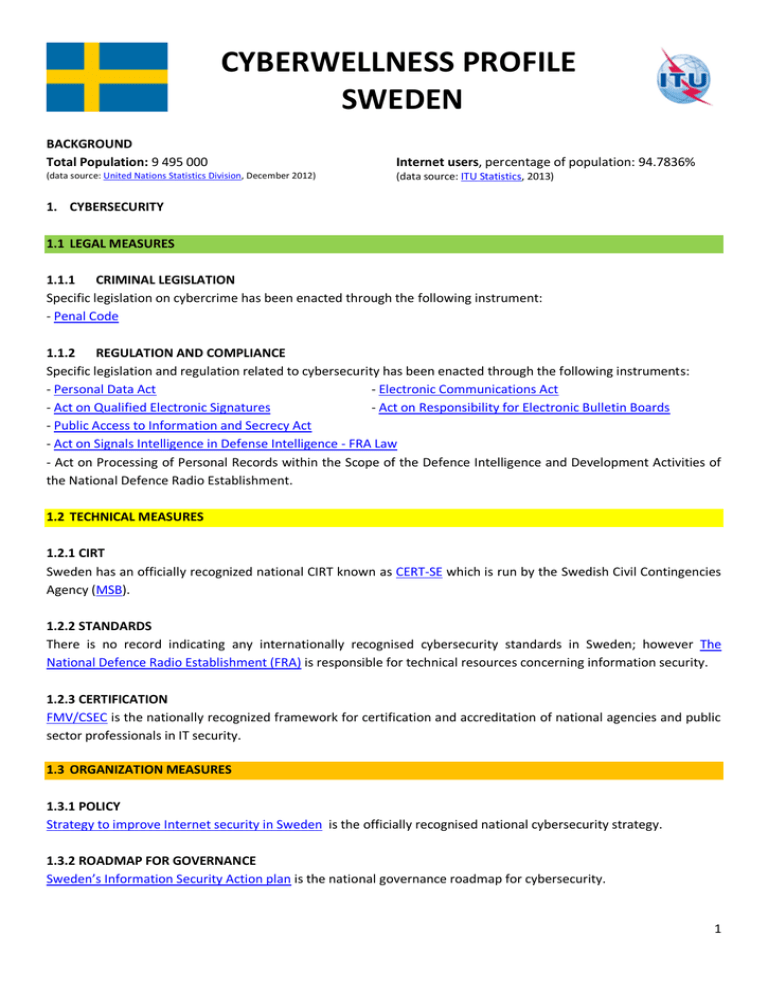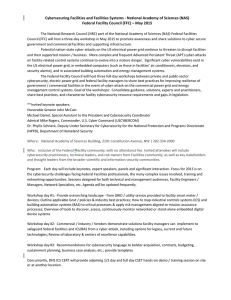CYBERWELLNESS PROFILE SWEDEN
advertisement

CYBERWELLNESS PROFILE SWEDEN BACKGROUND Total Population: 9 495 000 Internet users, percentage of population: 94.7836% (data source: United Nations Statistics Division, December 2012) (data source: ITU Statistics, 2013) 1. CYBERSECURITY 1.1 LEGAL MEASURES 1.1.1 CRIMINAL LEGISLATION Specific legislation on cybercrime has been enacted through the following instrument: - Penal Code 1.1.2 REGULATION AND COMPLIANCE Specific legislation and regulation related to cybersecurity has been enacted through the following instruments: - Personal Data Act - Electronic Communications Act - Act on Qualified Electronic Signatures - Act on Responsibility for Electronic Bulletin Boards - Public Access to Information and Secrecy Act - Act on Signals Intelligence in Defense Intelligence - FRA Law - Act on Processing of Personal Records within the Scope of the Defence Intelligence and Development Activities of the National Defence Radio Establishment. 1.2 TECHNICAL MEASURES 1.2.1 CIRT Sweden has an officially recognized national CIRT known as CERT-SE which is run by the Swedish Civil Contingencies Agency (MSB). 1.2.2 STANDARDS There is no record indicating any internationally recognised cybersecurity standards in Sweden; however The National Defence Radio Establishment (FRA) is responsible for technical resources concerning information security. 1.2.3 CERTIFICATION FMV/CSEC is the nationally recognized framework for certification and accreditation of national agencies and public sector professionals in IT security. 1.3 ORGANIZATION MEASURES 1.3.1 POLICY Strategy to improve Internet security in Sweden is the officially recognised national cybersecurity strategy. 1.3.2 ROADMAP FOR GOVERNANCE Sweden’s Information Security Action plan is the national governance roadmap for cybersecurity. 1 1.3.3 RESPONSIBLE AGENCY The following are the agencies responsible for implementing the cybersecurity policies, strategies and roadmaps: - The Swedish Armed Forces (FM) - Office of Information Assurance and Cybersecurity - The Swedish Security Service (SÄPO) - The Swedish National Bureau of Investigation (RPS) - The Swedish Civil Contingencies Agency (MSB) . 1.3.4 NATIONAL BENCHMARKING The Swedish Data Inspection Board (DI) is responsible for auditing with regards to the protection of personal data and the privacy of individuals in the information society. DI also carries out inspections and issues guidelines on cybersecurity. This is the nationally recognized benchmarking and referential to measure cybersecurity development. 1.4 CAPACITY BUILDING 1.4.1 STANDARDISATION DEVELOPMENT There is no information on any nationally recognized programs and/or exercises for research and development (R&D) of cybersecurity standards, best practices and guidelines. 1.4.2 MANPOWER DEVELOPMENT Sweden has recognized various types of awareness programs on cybersecurity, for the general public as well as for public and private sector employees: - European Cyber Security Month - The Swedish Defense Research Agency (FOI) conducts research on many aspects of cybersecurity and maintains a Cyber Range and Training Environment (CRATE) for experiments, competitions and exercises. - The Swedish National Defense College (FHS) conducts strategic cybersecurity and cyber defense studies and develops educational high-level courses on information assurance together with procedures and manuals on how to build technical cyber defense exercises (CDX). -The Swedish International Development Cooperation Agency (Sida) has ICT development related activities as one of its prioritized focus areas and works through support to global, regional and local initiatives in the field of policy and rule of law, strengthening and protecting human rights, and both civic and cyber capacity building. Sida addresses cyber security related issues from a human rights based approach, focusing on bottom-up initiatives for democratization and economic growth. This is being made both through initiated policy related work in normative processes, International Training Programmes (ITP) and directed support to a large number of actors across the world. 1.4.3 PROFESSIONAL CERTIFICATION CERT-SE team is certified under internationally recognized certification programs in cybersecurity. 1.4.4 AGENCY CERTIFICATION CERT-SE is the certified government agency in Sweden. 1.5 COOPERATION 1.5.1 INTRA-STATE COOPERATION Sweden participates and contributes actively in various international cyberspace fora, while also seeking bilateral and regional dialogues on cyber-issues, including in the Nordic-Baltic region. Sweden contributes substantially to cyber capacity-building efforts in low- and middle income countries through its international development cooperation, with an explicit focus on improving access to and increasing the use of open and secure ICTs through by means of improved infrastructure, regulation and institutions. 2 1.5.2 INTRA-AGENCY COOPERATION CERT-SE provides means for information sharing, collaboration and feedback between public administration bodies. 1.5.3 PUBLIC SECTOR PARTNERSHIP Sweden does not currently have an officially recognized national or sector-specific program for sharing cybersecurity assets within the public and private sector. 1.5.4 INTERNATIONAL COOPERATION Sweden, through CERT-SE, actively engages international counterparts through platforms such as: - FIRST - ENISA - OSCE - Nordic-Baltic (NB8) - UN GGE - IGF. 2. CHILD ONLINE PROTECTION 2.1 NATIONAL LEGISLATION Specific legislation on child online protection has been enacted through the following instrument: -Chapter 16, §10(a) of the Criminal Code. 2.2 UN CONVENTION AND PROTOCOL Sweden has acceded, with no declarations or reservations to articles 16, 17(e) and 34(c), to the Convention on the Rights of the Child. Sweden has acceded, with no declarations or reservations to articles 2 and 3, to the Optional Protocol to The Convention on the Rights of the Child on the Sale of Children, Child Prostitution and Child Pornography. 2.3 INSTITUTIONAL SUPPORT There is no information about the institution responsible for online protection for children. 2.4 REPORTING MECHANISM BRIS website provides a helpline via a phone number but also email and chat services. ----------------------------------------------------------------------------------------------------------------------------------------------------------DISCLAIMER: Please refer to http://www.itu.int/en/Pages/copyright.aspx More information is available on ITU website at http://www.itu.int/en/ITU-D/Cybersecurity/Pages/default.aspx Last updated on 21th January 2015 3


